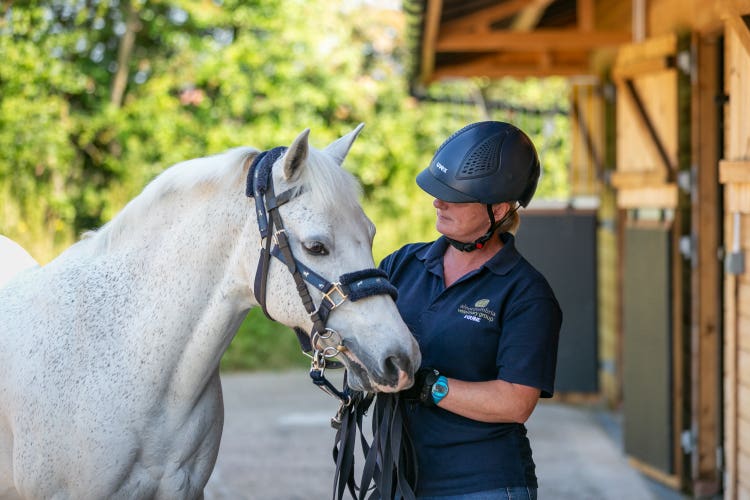
CVS Equine asks all veterinary colleagues to wear PPE
2xl
2025-05-19
base
Research
transparent
medium
false
right-aligned
white
Move follows three-year research project which identified over 25% of injuries lead to hospital attendance
CVS Equine has introduced mandatory personal protective equipment (PPE) for all of its veterinary colleagues.
It follows a three-year research project collaborating with the University of Liverpool which revealed that 90% of veterinary clinicians have experienced an injury during their career.
From early 2025, all vets, nurses and technicians will be required to wear a hard hat in the vicinity of a horse, pony or donkey – whether in practice, on a yard, or at a client’s premises.
It is hoped that the move will reduce injuries to the head – one of the most common traumas to be suffered by equine vets identified by the research, usually sustained when examining distal limbs.
The veterinary industry is considered one of the most dangerous professions. In the USA it is the second highest profession for non-fatal injuries, with equine vets sustaining on average eight serious injuries during their career[1]. The University of Liverpool research found that over 25% of equine vet injuries have led to hospital attendance.
link-1
Dr. John Tulloch, Lecturer and European Specialist in Veterinary Public Health at the University of Liverpool who led the research, said:
Sophie Ignarski, Equine Director at CVS said:
“Vet visits are not an ‘everyday activity’ for a horse. As a result, many horses will be on heightened alert, and some may be more prone to unpredictable behaviour. Vets are often in a vulnerable situation when examining a horse. And it’s difficult to pick up on a horses’ signals, especially when examining areas such as distal limbs. Our research found that many injuries happen when a horse kicks or pushes a person over and the person’s head makes impact with the ground. So, wearing a hard hat will be a big step towards preventing traumatic head injuries if this were to happen.”
“All of our clinicians are at risk in their day-to-day work – whether they are newly qualified or very experienced. Other colleagues including nurses, vet techs and patient care assistants are similarly vulnerable. We decided to make wearing of hard hats mandatory in order to protect all of our colleagues and minimise the potential risk of head injury, understanding it can never be fully eliminated. We recognise that this policy shift represents a degree of change but hope that it serves to further support and progress the equine veterinary industry more widely. Our policy is evidence-based, utilising three years of rigorous research, and we will continue our efforts in the future to grow our knowledge and understanding of this important area. By doing so, we join other industries – such as construction – who have already adopted similar changes to the extent they are now established in their culture.”
Starting in 2022, The University of Liverpool’s ‘The context, consequence and prevention of veterinary workplace injuries: a qualitative and quantitative study in the UK’ study has explored the context, consequences and behaviours surrounding veterinary workplace injuries - to improve the safety of the profession. It was supported by £74,400 of CVS funding as part of its Clinical Research Awards.
The most recent article from this study has been published in Preventative Veterinary Medicine - ‘‘It’s only a flesh wound’ – Understanding the safety culture in equine, production animal and mixed veterinary practices.’
It found that 49% of equine vets are injured annually. These injuries were predominately kicks to the leg or head, and usually involved the examination of a horse’s distal limb, with most not wearing hard hats. Over 25% of equine vet injuries led to hospital attendance or admission. Despite this few took time off work, citing guilt of extra workload to colleagures, or minimised the severity of their injuries. Many injuries went unreported due to accepted risk and doubts about reporting impact. This study exposes a culture in large animal veterinary workplaces that normalises injuries and undervalues safety. The lack of protective measures and the tendency to continue working despite serious injuries, highlight a need for urgent cultural and systemic change. CVS are trying to drive this change, evidenced by their new hard hat policy.
An extensive cross-sectional survey has been conducted with 740 veterinary colleagues, broadly representative of the profession. Analysis has explored how injuries and their context are perceived by veterinary profession, as published in Occupational Medicine journal.
Amongst the overarching themes identified were:
CVS Equine provides a complete range of industry-leading veterinary services at 21 sites across the UK as well as its out of hours clinical and call answering services, Equicall and Equicomms. Its ambulatory veterinary surgeons are supported by a team of over 20 recognised Veterinary Specialists in internal medicine, surgery, dentistry, sports medicine, reproduction and diagnostic imaging based within a network of referral centres. The division offers a multi-disciplinary approach, along with the latest veterinary treatments, diagnostic services, advice, standards and support – as a result of unrivalled investment in people, equipment, facilities and research.
[1] on average
ref-1